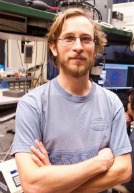非常抱歉,
你要访问的页面不存在,
非常抱歉,
你要访问的页面不存在,
非常抱歉,
你要访问的页面不存在,
验证码:

职称:Research Assistant Professor
所属学校:Georgetown University
所属院系:Department of Physics
所属专业:Physics, General
联系方式:(202) 687-6004
Initially trained as a physicist in experimental nonlinear dynamics, Ryan has been increasingly drawn to highly interdisciplinary fields and is particularly interested in areas with social relevance. While he currently maintains effort in a number of innovative biologically-motivated research projects, his deepest interests are in family health, relationships, social justice, and nonviolence. In 2003, he co-founded NotJustSkin, an all-volunteer nonprofit with the goal of integrating ethical, structural, and scientific analyses of the U.S. maternity care system with local offerings of person-centric counseling, support, and diversity services. In 2008, he co-founded Maitri House, an intentional community with an innovative co-ownership structure. He has facilitated over 200 workshops and support group meetings on communication, relationship skills, and conflict resolution including across differences in race, gender, culture, and sexuality. He is also a parent of a child with what physicians call "profound developmental differences."
Ryan received his PhD in Physics (Experimental Nonlinear Dynamics) at the University of Maryland. The scientific term chaos comes from the field of nonlinear dynamics. He worked with Rajarshi Roy studying chaotic laser dynamics, particularly focusing on understanding the variety of dynamics an electronically driven laser system could produce and ability of lasers to respond and synchronize to signals. He also worked with Daniel Lathrop and Benjamin Zeff, studying energy dissipation at microscopic scales in turbulent fluid flow. One paper, written with Atsushi Uchida and Rajarshi Roy, received the Laser Society of Japan's "Year’s Most Promising Science Technology Research Paper." After completing a PhD in 2003, Ryan moved to Georgetown University to collaborate with Jeff Urbach on creating a biological dynamics imaging laboratory in the Physics Department. He also helped develop collaborations with several laboratories in the biological sciences to provide interesting challenges for the dynamics imaging laboratory. This research has ranged across topics including malaria, Giardia, axon growth, biomaterials, imaging technique development, and cancer. In 2007, Ryan received an NIH K25 award to study invadopodia and cancer cell dynamics during invasion.